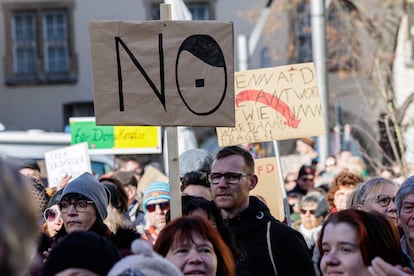Major German companies mobilize to prevent populist support in European elections
An alliance of 30 large consortiums warned against the rise of extremist and racist groups. ‘We want more diversity, more openness and more tolerance for a society worth living in’


Amid the European election campaign and a heated debate in Germany on how to protect politicians from attacks in an atmosphere of growing hatred, 30 of the country’s major business consortiums have joined forces to campaign and raise awareness, at least among their 1.7 million employees, against populist movements. The alliance, which they have dubbed “We stand for values,” is calling for votes for pro-European parties and warning of the dangers of supporting groups such as the far-right Alternative for Germany (AfD). This is a particularly sensitive issue in Germany, a country that requires immigration to maintain its economic activity.
The rise of the far right has led to something previously unimaginable in Germany: that corporate meddling in election campaigns now seems reasonable. The CEOs of Deutsche Bank, Deutsche Bahn (the public railroad company) and Siemens have joined the top executives of other major companies in taking a stand against extremism, populism and racism, and warning of the consequences this could have for Germany as a business destination after witnessing some red lines being crossed such as the term “re-emigration” — that is, the departure from the country of immigrants and German citizens of migrant origin — coined by the far right.
“Extremists and racists are dividing our society, dividing our country, and endangering our prosperity,” said Roland Busch, CEO of Siemens, during a joint appearance with his counterparts from Deutsche Bahn, Richard Lutz, and Deutsche Bank, Christian Sewing, on Monday.
“We want more diversity, more openness and more tolerance for a society worth living in, and prosperity,” he said of something he believes is the basis for innovative strength and competitiveness. “They are jeopardizing what we have built,” warned Busch, who is not afraid to make compromises even if it causes him to lose business. “If customers cancel orders, that’s the way it is. But I don’t think that will be the case.”
The business alliance includes many firms from the DAX, Germany’s benchmark stock market index, such as Bayer, Volkswagen, Eon, BMW, Allianz, Mercedes, and BASF, among others. The German Trade Union Confederation (DGB) and the Federation of German Industries (BDI) have also joined the initiative, whose purpose is to engage in a dialogue with employees through internal discussion rounds, workshops, video messages, and informative events. The focus is on the economic added value of diversity, openness, and tolerance.
In April, Reinhold Würth, an entrepreneur from the wealthy state of Baden-Württemberg, wrote a personal letter to his employees in which he warned them against voting for populists, explicitly mentioning the AfD. A few days ago, Würth explained that he had received a lot of support for his commitment, although some customers had also announced that they no longer wanted to buy from the fastener and fastening technology giant. But that eventuality is not causing concern among the executives. “We live with a historical responsibility,” said the head of Deutsche Bahn, who recalled the German railroad company’s involvement in the Holocaust, and as such “now is the time to stand up for universal values and not subordinate everything to economic success.”
Lutz warned that due to the various crises hitting the country, many people feel insecure and abandoned, and populists are trying to capitalize on this. “But these people’s seemingly simple answers to complex problems will never work,” noted Siemens CEO Busch.
Necessary migration
The Deutsche Bahn CEO also pointed out that, in view of the enormous shortage of skilled labor in the country, Germany needs immigration. According to the Institute for Employment Research, the country’s labor market needs 400,000 skilled workers from abroad every year. In addition, Lutz pointed out that due to its export orientation, companies are also dependent on a strong European Union.
“Our great trump card is Europe,” Sewing remarked. “Populists want less Europe or even an exit from the EU. That would be a big mistake,” warned the head of the country’s largest bank, pointing to the danger this poses for investors who are looking at what is happening in Europe’s largest economy with “growing skepticism.” For years, Germany has paid lower interest rates on capital markets than other countries, partly because of its traditional political and cultural reliability, the Deutsche Bank CEO noted. This is now endangered by extremist positions on the left and right. In his view, a strong democracy is the prerequisite for economic success.
Meanwhile, Lutz quoted Irish philosopher Edmund Burke to illustrate his support for the alliance. “The only thing necessary for the triumph of evil is for good men to do nothing,” said the head of the German railroads, who highlighted the fact that people are afraid to get involved in politics, something that has to be addressed, even if it is not easy task. “There are many indications that we are facing a fateful election in Europe,” Lutz said. “We campaign for a democratic Germany within a united Europe, also because this is to some extent the basis for our companies’ businesses and thus the basis for growth and prosperity.”
Sign up for our weekly newsletter to get more English-language news coverage from EL PAÍS USA Edition
Tu suscripción se está usando en otro dispositivo
¿Quieres añadir otro usuario a tu suscripción?
Si continúas leyendo en este dispositivo, no se podrá leer en el otro.
FlechaTu suscripción se está usando en otro dispositivo y solo puedes acceder a EL PAÍS desde un dispositivo a la vez.
Si quieres compartir tu cuenta, cambia tu suscripción a la modalidad Premium, así podrás añadir otro usuario. Cada uno accederá con su propia cuenta de email, lo que os permitirá personalizar vuestra experiencia en EL PAÍS.
¿Tienes una suscripción de empresa? Accede aquí para contratar más cuentas.
En el caso de no saber quién está usando tu cuenta, te recomendamos cambiar tu contraseña aquí.
Si decides continuar compartiendo tu cuenta, este mensaje se mostrará en tu dispositivo y en el de la otra persona que está usando tu cuenta de forma indefinida, afectando a tu experiencia de lectura. Puedes consultar aquí los términos y condiciones de la suscripción digital.








































